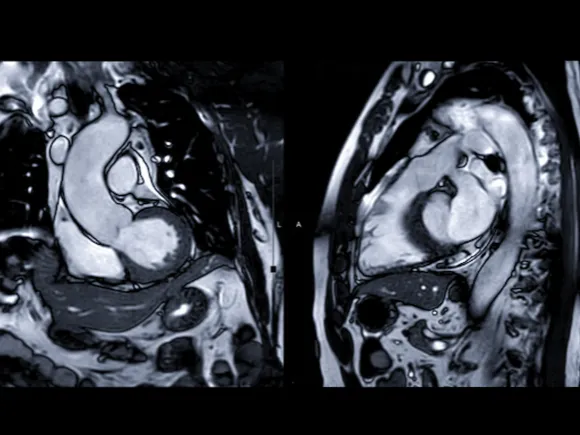
Overview
A cardiac magnetic resonance image (MRI), sometimes abbreviated as CMR, is a non-invasive imaging test that uses magnetic fields and radio waves to create images of the heart.
Everything You Need To Know
- Why It’s Done
-
This test helps evaluate the squeezing capacity of the heart and the presence of valvular abnormalities, congenital cardiac abnormalities, scarring within the muscular tissue of the heart or abnormal protein deposition in the tissue of the heart.
It may be ordered for patients who have:
- Heat rhythm abnormalities.
- Heart failure of unclear cause.
- Coronary disease to evaluate the viability of damaged tissue.
- Concern for congenital abnormalities such as hypertrophic cardiomyopathy (abnormally thick heart muscle).
- Concern for cardiac amyloidosis (abnormal deposition of proteins in the heart).
- Concern for myocardial iron deposition (excess iron in the heart tissue)
- Valvular heart disease that is difficult to evaluate with other imaging studies
- Where Is This Test Performed?
-
We offer this test at AdventHealth Shawnee Mission and AdventHealth Lenexa City Center. Please arrive 30 minutes before your test is scheduled to allow for check in. The procedure will take approximately 90-120 minutes.
- Preparation
-
Your physician may prescribe a single dose of a beta blocker to be take one hour before the test. This oral medication will slow your heart rate, enabling the scan to produce a clearer image. Please let your physician know if you have had side effects from beta blockers or MRI (gadolinium based) contrast dye in the past. You will not need to hold any of your medications, and you do not need to be fasting for this test. You will be able to drive yourself home after the test is done and there are no restrictions afterwards.
Additional Instructions:
- Do not exercise the morning of the procedure.
- Do not wear any unnecessary metal items such as jewelry.
- Wear comfortable clothing, preferably with a short-sleeved t-shirt.
- During and After the Procedure
-
Depending on what is being evaluated by the cardiac MRI, gadolinium-based contrast may be required. If your MRI requires the use of contrast the technician will insert an IV into your hand or arm to deliver the contrast. Before you go into the magnet room you will be asked to remove any metal objects on your person, and these will be stored for the duration of the test. Given the length of test, you will be given a chance to go to the bathroom as well.
You will then be taken to the main magnet room and you will lie on a long table. Prior to starting the scan, you will have EKG electrodes placed on your chest to measure and record your heart rhythm, which is necessary for image acquisition. You will also have a cover placed on your chest that is part of the scanning equipment. You will then have headphones placed on your ears for you to hear the breath holding instructions.
A technician will operate the scanner in a separate room that is separated from the exam room by a glass window. You will be able to communicate with the technician via an intercom system. Once image acquisition is started, the test may take 60-90 minutes.
After the cardiac MRI is complete, you can immediately return to normal activities with no restrictions. You should be able to drive yourself home.
- About Gadolinium-Based Contrast
-
A cardiac MRI may use contrast. The contrast is gadolinium based and is different from the contrast used for CT imaging. Generally speaking, the contrast is very well tolerated. However, it is possible to experience symptoms such as nausea, rash, headaches or dizziness. These symptoms are rare and, when they do appear, are generally short-lived.
Your Results
The coronary Cardiac MRI will be read and interpreted by one of our board-certified cardiologists. You should receive a call with the results within a week of having the test done or you may view the results in your AdventHealth Patient Portal.
